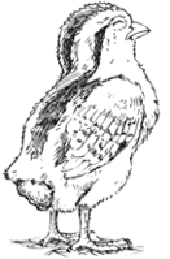Agriculture Reference
In-Depth Information
adding a small amount of antibiotic to the water; currently raisers use Terramycin or
oxytetracycline to attack the problem systemically.
Pasty back end is a common symptom of shipping stress.
To correct the problem externally, place a warm, wet paper towel on the manure
buildup and pull very gently to remove the plug of waste from the bird's behind.
Don't yank on it, or you might wrench the insides right out of the chick. After you've
removed the pasty manure buildup, it doesn't hurt to dab mineral or vegetable oil (not
scented oil) on the back end. This will relieve the pasting and help reduce the sticki-
ness, keeping more deposits from forming.
Generally, pasty back end is caused by an opportunist bacterium that takes ad-
vantage of shipping stress and the inability of the young body to fight it off. It does
not have to be life-threatening, however. Before antibiotics were available, the old-
fashioned way my father taught me to combat the condition involved mixing equal
parts dry cornmeal, mashed hard-boiled egg yolk, and black pepper, and offering it
as the sole food for the chicks. I am fairly sure this had no antibiotic properties, but it
seemed somewhat effective and was easy to make.
Pasty back ends typically occur only in shipped chicks and primarily in chicks
shipped during cool times of the year. Chicks hatched at your own particular facility
will probably never have this condition. The best way to avoid this manifestation of
stress is to closely watch the chicks from shipments made during cold seasons.
Stir up the shavings or clippings
every day or so, and replace sections near the wa-
ter source that become waterlogged.


